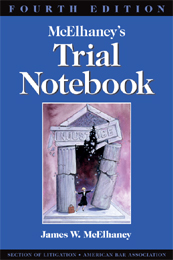« D.C. Circuit vacates air monitoring rule. | Main | Lawyers, Voting and Voters' Rights »
October 01, 2008
Informal discovery: save time, save money, get better results.
Twenty years ago, James McElhaney, a gifted lawyer, writer and teacher of trial tactics, and the ABA Litigation Section, first published McElhaney's Trial Notebook, now in its fourth edition. Discovery, McElhaney notes, is a good way to learn what a witness will say, or to bind a party or witness to a particular version of the facts.
However, formal discovery "is a very inefficient way to get information." There are lots of investigation ideas in McElhaney's book, but they all involve simple curiosity and do-it-yourself "trolling" for information the trial lawyer gets first-hand on his or her own. Next time a new case begins, resist rushing into written discovery and depositions. Step back from the discovery routine--you'll get into

that bubble soon enough--and learn a few things on your own. Just as witnesses say unexpected and even startling things when they testify, useful and even surprising facts are available about opposing parties through the Internet, court files, published cases, D&B reports, news archives and business libraries. These inexpensive but ignored sources are often inconsistent with information parties will give about themselves in formal discovery.
Posted by JD Hull at October 1, 2008 11:59 PM